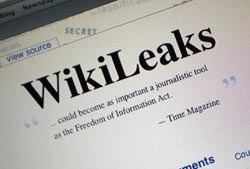Debates on WikiLeaks disclosures get hotter in U.S.
Disclosures of confidential U.S. government documents have stimulated a hot debate in the United States. Are they acts of espionage, terrorism, or journalism? Do media have the right to release those documents? And who is to blame?
|
Don't miss |
 |
U.S. Congressman Peter King of New York called for Assange to be charged under the Espionage Act and asked whether WikiLeaks can be designated a terrorist organization.
The U.S. government is also investigating whether Assange can be charged with other crimes such as theft of government property or receipt of stolen government property.
It is expected that Assange will defend himself with the First Amendment, which protects freedom of speech and freedom of the press.
Assange has portrayed himself as a crusading journalist. He told ABC News via e-mail that his latest batch of State Department documents would expose "lying, corrupt and murderous leadership from Bahrain to Brazil." He told Time magazine he targets only "organizations that use secrecy to conceal unjust behavior."
But some lawyers argued that WikiLeaks has gone where no journalist has gone before. News organizations have often sought information, including government secrets, for specific stories and printed secrets that government workers delivered to them, but none has matched Assange's open worldwide invitation to send him any secret or confidential information a source can get.
The issue is whether Assange is a journalist, and whether releasing confidential information obtained by others and transferred to him on the website is journalism.
It seems hard at this moment to decide whether the mass disclosure of secret U.S. government documents is journalism or espionage. Even if Assange has been charged with espionage, the debate will continue in court.
Many Americans are asking whether they should have access to those documents.
The New York Times and its global edition, the International Herald Tribune, said the public has the right to know how Washington makes big decisions that could cost the country most heavily in lives and money. But the question is how and when to release such information.
The paper admits that premature disclosures could undermine U.S. national interests and international relationships.
 0
0 







Go to Forum >>0 Comments